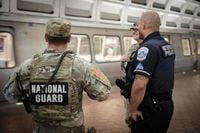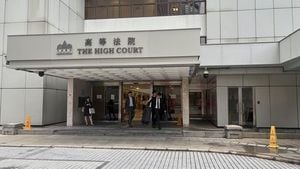As the sun sets on another sweltering September day in Chicago, the city finds itself at the epicenter of a national controversy that’s sparking protests, political posturing, and deep unease among residents and officials alike. President Donald Trump’s recent remarks and social media posts have thrown the Windy City into the spotlight, as he threatens federal intervention and hints at military deployments to combat what he describes as rampant crime. But the rhetoric, the memes, and the looming prospect of boots on city streets have triggered fierce resistance from Illinois leaders and ignited a broader debate about the role of federal power in American cities.
It all began with a social media post on September 6, 2025, when President Trump referenced the newly rebranded Department of War in a message that included a manipulated image and the caption, “I love the smell of deportations in the morning.” The post, a nod to the iconic line from the war film Apocalypse Now, was accompanied by an image of Trump dressed as Lt. Col. Bill Kilgore and the phrase “Chicopalypse Now.” The message was clear—Trump was signaling a hardline approach to Chicago’s crime and immigration issues, and he wasn’t subtle about it.
Trump’s rhetoric didn’t stop there. On September 8, he doubled down, declaring at the Museum of the Bible, “We’d love to go into Chicago and straighten it out.” He urged the people of Illinois to “band together and DEMAND PROTECTION,” even as police data showed that murders and shootings in Chicago were actually down compared to the previous year, according to ABC News. “I want to help the people of Chicago, not hurt them. Only the Criminals will be hurt! We can move fast and stop this madness,” Trump insisted in a social media post.
The president’s comments unleashed a torrent of criticism from Illinois’ Democratic leadership. Governor JB Pritzker, a prominent Democrat and likely contender for the 2028 presidential race, was quick to respond. “I want to help people, not hurt them, says the guy who just threatened an American city with the Department of War,” Pritzker wrote on X, formerly Twitter. He made it clear that Illinois would not request federal troops, stating, “When did we become a country where it’s okay for the U.S. president to insist on national television that a state should call him to beg for anything, especially something we don’t want?”
Chicago’s Mayor Brandon Johnson echoed Pritzker’s concerns, issuing an executive order on August 30 demanding Trump “stand down from his threat” to deploy military forces. “The City of Chicago will do everything in our power to defend our democracy and protect our communities,” Johnson said in a statement. “With this executive order, we send a resounding message to the federal government: We do not need nor want an unconstitutional and illegal military occupation of our city.”
Despite the heated words, Trump appeared to soften his tone when pressed by reporters. “We’re not going to war; we’re going to clean up our cities,” he told the press on September 7. “We’re going to clean them up so they don’t kill five people every weekend. That’s not war. That’s common sense.” Yet, the ambiguity lingered, leaving Chicagoans and city officials on edge. Trump’s border czar, Tom Homan, added fuel to the fire, telling CNN that while he wouldn’t specify if or when the National Guard would be deployed to Chicago, “National Guard are always on the table.”
Meanwhile, the federal government wasn’t just talking. On September 8, Immigration and Customs Enforcement (ICE) launched “Operation Midway Blitz,” a sweeping crackdown targeting what the Department of Homeland Security described as “criminal illegal aliens who flocked to Chicago and Illinois.” The operation was presented as a direct response to what Trump and his allies have characterized as lax sanctuary policies under Governor Pritzker’s administration.
Nationally, the Trump administration’s reliance on federal troops for domestic operations has been ramping up. Since January, roughly 10,000 active-duty and National Guard troops have been sent to the U.S. southern border, and nearly 5,000 were deployed to Los Angeles in June—moves that met with resistance from local leaders like California Governor Gavin Newsom and Los Angeles Mayor Karen Bass. A federal judge recently ruled that the use of federal troops in Los Angeles was illegal, highlighting the fraught legal landscape surrounding such interventions.
Military experts and activists have voiced deep concerns about the impact of these deployments. Jennifer Kavanagh, director of military analysis at the Defense Priorities think tank, warned in an interview with Military.com, “If you’re using National Guard forces, you pull them away from their jobs, you keep them away from their families and then if, God forbid, there were a crisis overseas where we actually needed military forces, you would have worn down the readiness.” The ongoing deployment of over 2,000 National Guardsmen from six states to Washington, D.C., is costing taxpayers an estimated $1 million a day, according to CNN.
For many in Chicago, the president’s rhetoric and the threat of military occupation feel deeply personal—and frightening. Sara Haghdoosti, a Chicago resident and executive director of the advocacy group Win Without War, told Military.com, “As someone who lives in Chicago, it’s terrifying. A commander in chief is meant to be someone who is thinking about how to keep folks safe, not declaring war on our own communities. And even if he walked it back, the fact that he ever considered saying that, the fact that it was articulated, is deeply horrific.”
The situation in Chicago is also reverberating through national politics. With the economy sagging and Trump’s tariffs under fire, some analysts, like Greg Valliere writing for AGF Management Limited, suggest that the president’s focus on Chicago is a calculated distraction from other political woes. Valliere speculated that federal troop deployments could expand to other Democratic-run cities such as Baltimore, Oakland, and Boston, further inflaming partisan tensions as the 2025 fiscal year draws to a close.
Not everyone is convinced that federal intervention is the answer. New York Police Commissioner Jessica Tisch, speaking at a public breakfast, made her opposition clear: “As a lifelong New Yorker, I am revolted by the idea of the militarization of our streets. I will be very clear with anybody, all of you, the attorney general, anyone who wants to talk to me about this that the NYPD, we’ve got this. We don’t need or want the federal government’s help here in that way.”
As Chicago braces for what may come, the city’s residents, leaders, and law enforcement agencies are left to navigate an uncertain future—one where the line between public safety and political theater has never seemed so blurred. The coming weeks will test not just Chicago’s resolve, but the nation’s commitment to balancing security, democracy, and the rule of law in a time of extraordinary tension.




